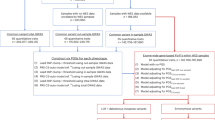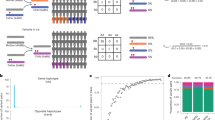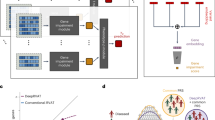Abstract
Advances in DNA sequencing technology have been promoting the development of sequencing studies to identify rare variants associated with complex traits. Adaptive strategy can be effective to reduce the noise provided by non-causal variants. However, the existing adaptive strategies depend on many assumptions. In this paper, we proposed a new adaptive strategy using entropy theory for association analysis. This entropy-based strategy is based on the magnitude of association between variants and disease and does not depend on the detailed association pattern with causal variants. We considered multi-marker test and Sum test with collapsing method to construct the entropy-based adaptive strategy. Using simulation studies, we investigated the performance of our method for rare variant analyses as well as for common variant analyses with multi-marker test and compared it with several existing adaptive strategies. The results showed that our method can improve the power and achieve good performance when there is a large number of non-causal variants and effects of causal variants are in the same direction for rare variant.
Similar content being viewed by others
Log in or create a free account to read this content
Gain free access to this article, as well as selected content from this journal and more on nature.com
or
References
Maher, B. Personal genomes: the case of the missing heritability. Nature 456, 18–21 (2008).
Morgenthaler, S. & Thilly, W. G. A strategy to discover genes that carry multiallelic or mono-allelic risk for common diseases: a cohort allelic sums test (CAST). Mutat. Res. 615, 28–56 (2007).
Li, B. S. & Leal, S. M. Methods for detecting association with rare variants for common diseases: application to analysis of sequence data. Am. J. Hum. Genet. 83, 311–321 (2008).
Pan, W. Asymptotic tests of association with multiple SNPs in linkage disequilibrium. Epidemiology 33, 497–507 (2009).
Madsen, B. E. & Browning, S. R. A groupwise association test for rare mutations using a weighter sum statistic. PLoS Genet. 5, e1000384 (2009).
Price, A. L., Kryukov, G. V., Bakker, P. I. W., Purcell, S. M., Staples, J., Wei, L. J. et al. Pooled association tests for rare variants in exon-resequencing studies. Am. J. Hum. Genet. 86, 832–838 (2010).
Neale, B. M., Rivas, M. A., Voight, B. F., Altshuler, D., Devlin, B., Orho-Melander, M. et al. Testing for an unusual distribution of rare variants. PLoS Genet. 7, e1001322 (2011).
Wu, M. C., Lee, S., Cai, T., Li, Y., Boehnke, M. & Lin, X. Rare-variant association testing for sequencing data with the sequence kernel association test. Am. J. Hum. Genet. 89, 82–93 (2011).
Pan, W. & Shen, X. T. Adaptive tests for association analysis of rare variants. Genet. Epidemiol. 35, 381–388 (2011).
Lee, S., Abecasis, G. R., Boehnke, M. & Lin, X. Rare-variant association analysis: study designs and statistical tests. Am. J. Hum. Genet. 95, 5–23 (2014).
Shannon, C. E. A mathematical theory of communication. Bell Syst. Tech. J. 27, 379–423 (1948).
Hampe, J., Schreiber, S. & Krawczak, M. Entropy-based SNP selection for genetic association studies. Hum. Genet. 114, 36–43 (2003).
Zhao, J., Boerwinkle, E. & Xiong, M. An entropy-based statistic for genomewide association studies. Am. J. Hum. Genet. 77, 27–40 (2005).
Li, Y. M. & Xiang, Y. Genotype-based association analysis via entropy. J. Hum. Genet. 57, 734–737 (2012).
Preston, M. D. & Dudbridge, F. Utilising family-based designs for detecting rare variant disease associations. Ann. Hum. Genet. 78, 129–140 (2014).
Acknowledgements
LYM was supported by National Natural Science Foundation of China (11301206), Foundation of Hunan Educational Committee (16A166), Hunan Provincial Natural Science Foundation of China (2017JJ2212) and China Scholarship Council. HWD was partially supported by grants from the National Institutes of Health [R01AR057049, R01AR059781, D43TW009107, P20 GM109036, R01MH107354, R01MH104680 and R01GM109068], the Edward G. Schlieder Endowment fund to Tulane University.
Author information
Authors and Affiliations
Corresponding author
Ethics declarations
Competing interests
The authors declare no conflict of interest.
Rights and permissions
About this article
Cite this article
Li, YM., Xu, C., Xiang, Y. et al. An adaptive strategy for association analysis of common or rare variants using entropy theory. J Hum Genet 62, 777–781 (2017). https://doi.org/10.1038/jhg.2017.39
Received:
Revised:
Accepted:
Published:
Issue date:
DOI: https://doi.org/10.1038/jhg.2017.39



